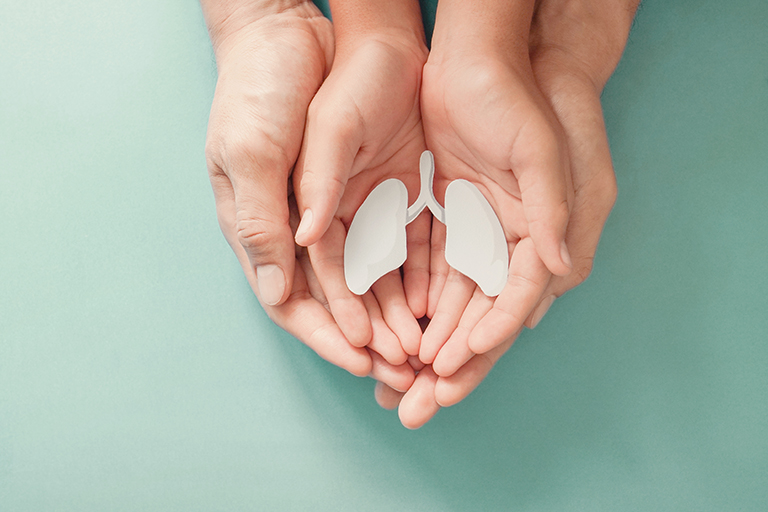
Breathe easy – Respiratory tips
Respiratory Care Week is Oct. 24 – 30, 2021. Life Care Centers of America is proud to recognize the respiratory staff who provide excellent care to those we serve and who have kept our patients living with respiratory wellness and breathing easy!
People often talk about health and wellness related to physical, social and emotional well-being, but do they ever discuss their respiratory health or even consider it?
Why Respiratory Health?
Since the current pandemic began, society is more concerned with respiratory monitoring and watching for signs and symptoms, but these are unfortunately present after an illness has already taken hold. Respiratory wellness is important to the foundation of someone living well.
The respiratory system includes many parts of our bodies. The nose, mouth, throat/pharynx, voice box/larynx, windpipe/trachea, large airways/bronchi, small airways/bronchioles and the lungs are all important parts in breathing. These parts, along with blood vessels and muscles, give our bodies the power to move oxygen throughout and to clean out waste like carbon dioxide.
Bodies need oxygen to obtain energy and to fuel all living cells.
The respiratory system works hard each day to sustain a healthy environment for our bodies to function at optimal capacity with the appropriate oxygenation. It is important that we do all we can to protect this system.
During the aging process, there are changes that affect lung tissue, muscles and bones; these things collectively impact breathing. At the age of 35, function can begin to decline, and as a result, breathing can become more difficult over time. This shows why it is important to keep the respiratory system healthy and active!
Risk Factors
Genetics, disease and the environment can affect the health of your lungs and cause respiratory problems. Environmental factors include smoking, pollution and illnesses. The following are ways you can enhance your respiratory wellness:
- Stop smoking and stay away from secondhand smoke.
- Avoid indoor and outdoor air pollution. Consider cleaning your air vents at home and in your car regularly. Utilize filters when possible and develop a routine for changing them.
- Compromised individuals with asthma and COPD should stay indoors and use air conditioning on hot and humid days.
- Use precautions when exposed to people with flu or other viral infections. Use good handwashing techniques, consider vaccinations and use masks.
- Good oral care reduces the bacteria and plaque in your mouth, which can cause inflammation in your mouth and airways and promote infection. Brush your teeth regularly.

Positive Ways to Improve Respiratory Health
Along with avoiding environmental risk factors, we can also participate in some activities that will help us foster wellness, optimal aging and a healthy respiratory system.
Let’s see how easy it is to start.
Sit up tall in your chair, or stand up straight. That’s right – posture is super important for our respiratory system to work right.
Now, chat with a friend and share your best joke. Was there laughter? Laughter helps with lung health by enhancing the intake of oxygen-rich air and stimulating the lungs, heart and muscles. It also helps reduce stress levels.

Along with stress-level reduction, physical activity not only strengthens your muscles but also your lungs. Aerobic activity (such as running, walking and biking) gives the lungs a workout for functioning efficiently. Weightlifting, stretching and Pilates all build core muscles and develop your posture, aiding in strengthening the respiratory system.
Moderate activity 30 minutes a day five days a week is the national recommended standard. With all new exercise programs, this tolerance must be built, and you should always consult a physician before beginning a new program.
Incorporating breathing exercises like diaphragmatic, simple breathing and counting breaths is also a way to keep the lungs strong.
What About Diet?
Eating a healthy, balanced diet and staying well hydrated are good for overall health. A balanced diet supplies the nutrients the body needs to work effectively. Without balanced nutrition, the body is more prone to disease, infection, fatigue and low performance. According to Healthline.com, the top 10 food choices for lung health include:
- Beets and beet greens: These are rich in nitrates, which have been shown to improve lung function.
- Peppers: These are one of the richest sources of vitamin C, which is especially important for those who smoke.
- Apples: Antioxidants and vitamins link this food to a reduced risk for lung cancer and asthma.
- Pumpkin: These are colorful and full of carotenoids, including beta carotene, lutein and zeaxanthin – all of which have powerful antioxidant and anti-inflammatory properties.
- Turmeric: Curcumin is a component of this spice, which supports anti-inflammatory properties.
- Tomato and tomato products: These have been shown to reduce airway inflammation.
- Blueberries: Loaded with nutrients, this fruit preserves and protects lung function.
- Green tea: The antioxidant, anti-inflammatory properties of this drink are known to inhibit fibrosis and scarring in the lungs.
- Red Cabbage: This veggie is full of fiber, and diets with increased fiber are shown to facilitate stronger lung function.
- Edamame: This food, also known as immature soybeans, is rich in isoflavones, which has been associated with decreased risk for diseases.

Lung health and the ability to breathe easily are important foundations for overall health, wellness and optimal aging. For further information on lung health and wellness, or for support to begin your journey to healthy lungs, visit the following sites:
- American Lung Association – lung.org
- National Heart, Lung, and Blood Institute – nhlbi.nih.gov

